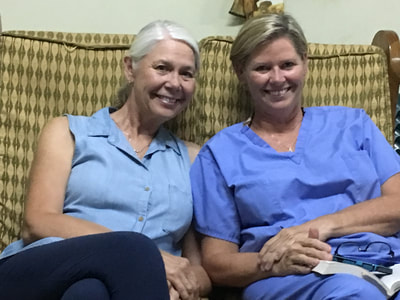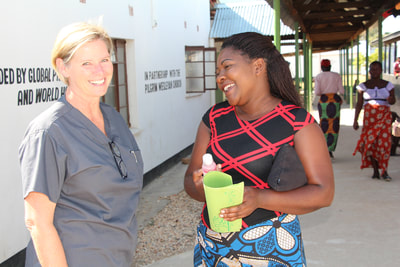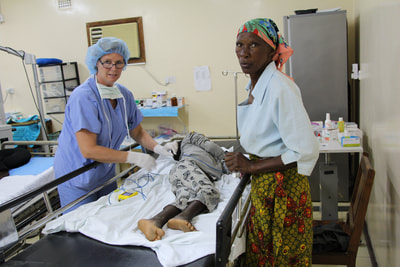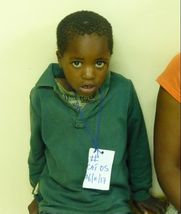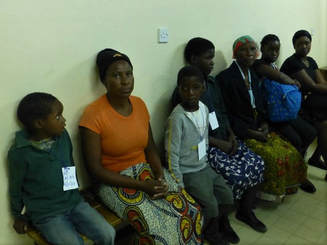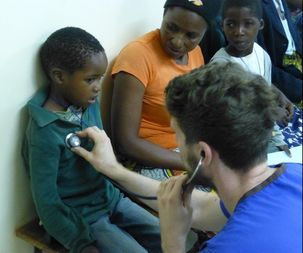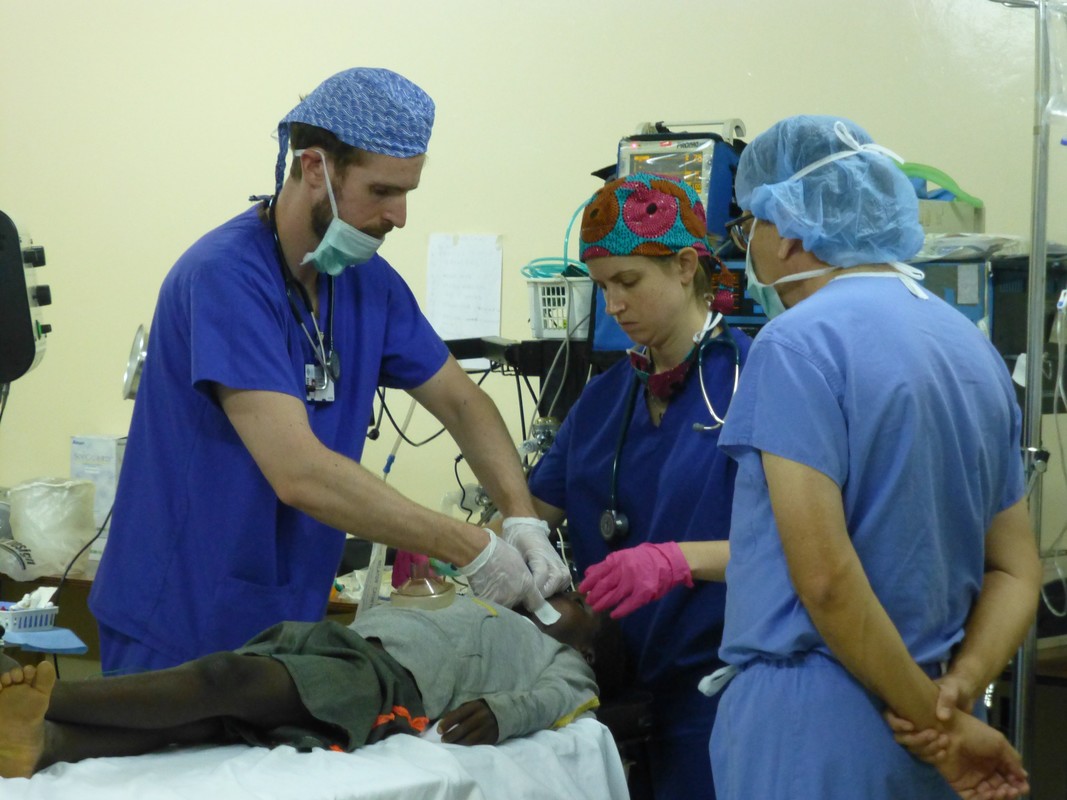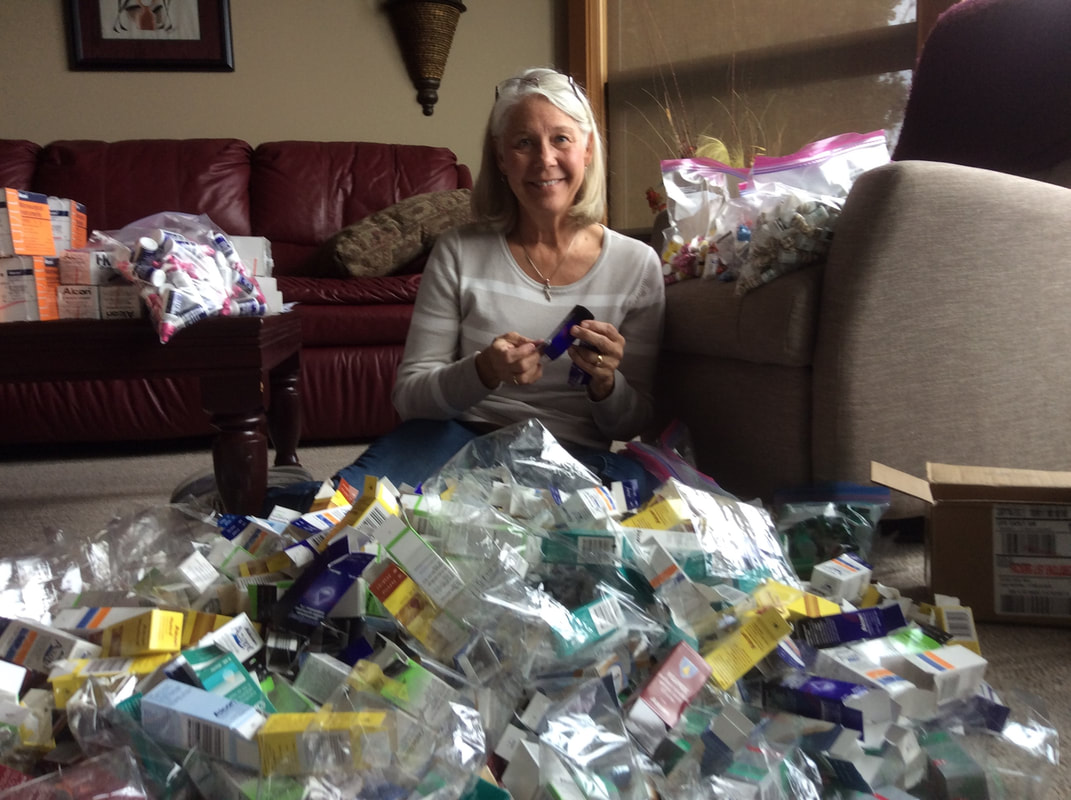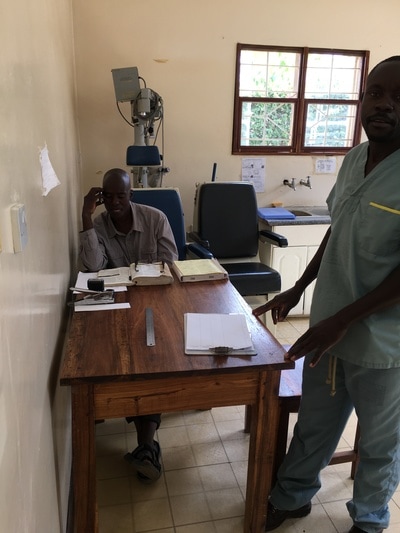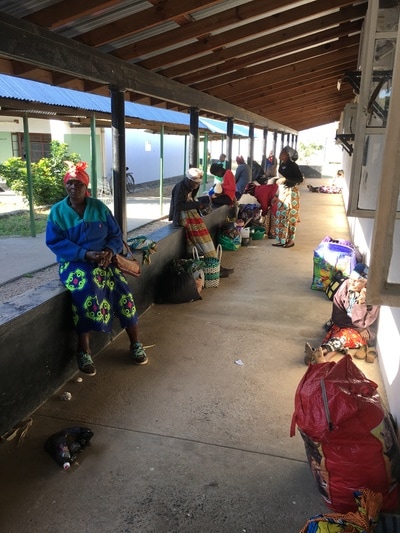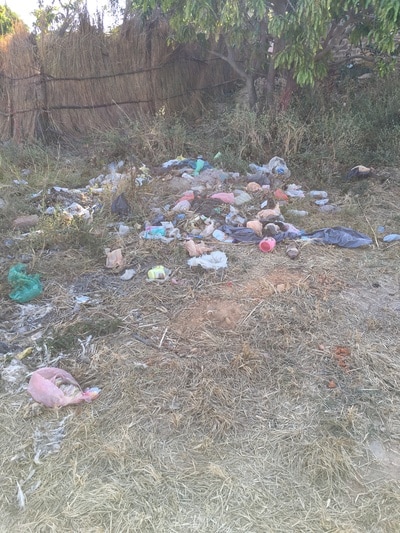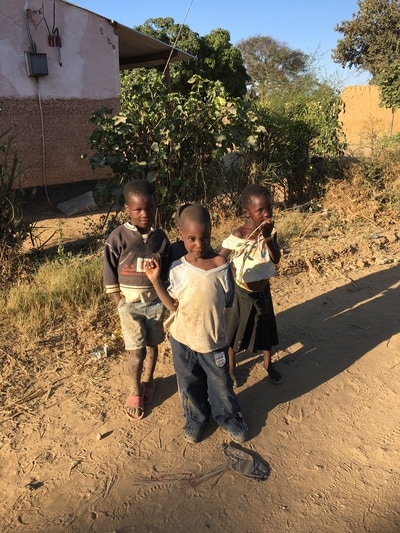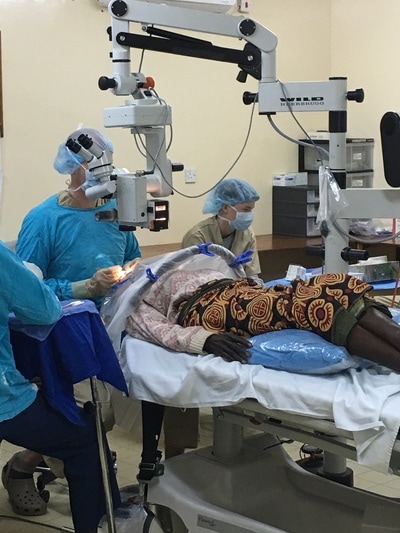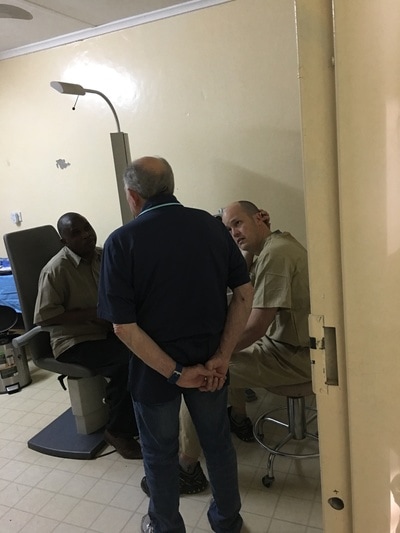|
We had an awesome team for the March eye camp, a truly international group. Dr. Sue Wallace flew from Canada, Dr, Mark Cichowski and his superwoman wife Jan came from the US, as well as Dr, Ivan Hwang and Dr, Bud Tysinger. We had anesthesiologists from the UK and Zambia, and of course we had our awesome "newbies" Anna Callanta, Betsy Baus, and Robin Alvarado from the US. Betsy and Robin launched our initiative to get our charts scanned during eye camps to help with continuity of care, as well as started our fledgling vision screening program in the local schools. Anna was the OR circulator, while Jan scrubbed in on every surgery, of which there were many! The newbies adapted to the accommodations without complaint (simple but clean and well built thanks to the Lintons), put their heads down, and worked hard until it was time to release them for a little free time They headed to Livingstone for their afternoon off so that they could take in the magnificent Victoria Falls. We did all take a break on the weekend to go for a safari, not realizing that we were in for a deluge of biblical proportions when we headed down to Botswana for a safari in Chobe National Park. The guide told us that we were extremely lucky to see lions trying to hunt water buffalo (they were unsuccessful)--some people never get to see them. Our anesthetists deserve extra kudos, for leaving Lusaka at 5 in the morning on Friday and driving all day to get to Zimba by 2 pm so that they could start some anesthesia assessments AND do a surgical case requiring general anesthesia. Then they got up really early with the rest of us to catch the ferry over to Botswana, went on safari all day, got drenched with the rest of us in the afternoon downpour, slept overnight in the tents in wet clothes, came back on Sunday night from Botswana only to get up early again the next day and do several general cases on Monday and Tuesday. Then they left in the wee hours on Wednesday morning to get back to Lusaka by the afternoon. Alex, Jayne's husband was however probably the most popular member of the UK team as he taught the two Sylvias (our housekeepers) how to make Yorkshire pudding. Alex knows that he and his Yorkshire pudding have a standing invitation to come to the San Francisco Bay Area. (Jayne is welcome to come too). More details about the surgeries that we did will be coming out in our next newsletter! In the meantime, enjoy this quick video I put together on the long trip home from Zambia on my slowed down iphone. Good thing the combined flight time was over 24 hours. For those of you who want more picture and photos, check out our facebook site (International Vision Volunteers USA). Remember we will be holding our annual event in October, likely the 20th, so please look for invitations later in the summer as well as notices on the facebook site. Thanks to all who supported us, whether it was collecting glasses and supplies, packing, running last minute errands, wishing us well, or donating money and supplies. We could not have done what we did without your love and support! Finally, our Zambian staff worked really hard supporting all our activities, and we appreciated their neverending cheerful support. Our clinic administrator Westone and Anton, drove 4 hours round trip at the last minute to ensure we had enough oxygen for our general anesthesia cases. That was above and beyond the call of duty! Enjoy the video, everyone. Next eye camp planned for August of this year....
2 Comments
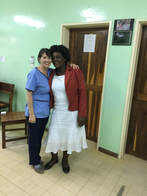 Besides our hardworking local Zambian staff who help to run the eye camps, we could not see as many patients as we do without our dedicated non physician volunteers. Some are nurses, some happen to be married to our volunteer physicians, and others are community members with various skills that we happily put to work. On our latest eye camp, we were fortunate to have Jan Cichwski, Lori George, and Julie Poel accompany the doctors and keep them on task and focused. Dr. Mark Cichowski had the incredible good fortune to have married his wife Jan as he was starting residency, and they have been an incredible team ever since. They have traveled extensively in various mission trips, not only to Zambia but to Haiti and other third world countries. Jan puts up with Dr. Mark in the operating room and is a wonderful OR nurse. When Collins, our regular OR manager was ill last year Jan stepped magnificently into the breach and scrubbed in on every single surgery for one of the busiest eye camps last year. She is still owed a day at the spa for that Herculean effort. Also, ask Jan sometime how her fingers are after prepping and packing the thousands (?) of ophthalmic medical drops, all of which had to be extracted out of their small boxes (see Facebook page).... in addition to being an awesome scrub nurse, Jan is a formidable Scrabble player and could beat all of us at Scrabble with half her brain sedated. Beware if she ever proposes a game of Scrabble for money. My advice is to just say no. Lori voluntarily accompanied her husband Dr. Stan George, and she will apparently not be persuaded out of that claim even after 2 weeks of long days of surgery and clinic. Lori has been described as a saint (by her husband no less). Lori undertook a thorough clean out and organization of our storeroom and pharmacy area, in between helping keep the patient flow running smoothly during the eye camp. We may need her to come back in a year or two for a repeat performance. And of course, if she must, she can bring Dr. George back too. Jan Cichowski persuaded her sister Julie, who is a neonatal ICU nurse , to come along to work during the eye camp. Hopefully even after long grueling days, Julie will consent to accompany another eye camp to Zambia. Her talents were put to good use in the eye clinic, especially for those difficult to insert IV’s in the children, and also in the main mission hospital where she helped train the labor and delivery staff in neonatal resuscitation. Julie and Jan both spent significant time in Africa as teenagers when their parents took their family on a mission that lasted much of their high school careers. While other high school kids were worried about dances and whether their clothes were cool enough, Jan and Julie were working in a small mission hospital in Africa helping to deliver babies. As you can see, we are grateful to our “unsung heroes.” The eye clinic would not run nearly as smoothly without them, and we appreciate their accomplishments. Thanks Jan, Lori, and Julie! The eye camp has been in full swing for a week now. Monday was reserved for pediatric surgical procedures. Although the kids are nervous, they are cooperative and very stoic. We were lucky to have Dr. Will Packer and Dr. Kirsty Smith, volunteer anesthsiologists from the UK, attend this eye camp to handle the general anesthesia cases. The team is busy preparing to leave for Zambia. Up in Washington state, Dr. Mark Cichowski and his wife Jan Cichowski, RN, are busily packing up. Jan's fingers are tired from opening up lots of small boxes of vials of medications, which she has to do in order to maximize luggage space. In Canada, Dr. Sue Wallace and Dr. Stan George are also packing and preparing for the long trip to Zambia. The team has a big surgical case load in front of them. Safe travels to them all!
The Patients…
The patients in rural Africa are certainly different than any we’ve seen in the U.S. This should be expected as their lifestyle and culture differs from ours. This healthcare system does not practice much preventative medicine resulting in disease and ailments that are much more advanced than the majority seen in the West. Additionally, because we are providing free and very inexpensive care in a poor area, one can expect to see a different level of cleanliness. To boot it is very dusty here; an environment built on sand-like, clay dirt. The patients we’ve seen have a variety of ailments. We’ve seen damage to eyes from violence. We’ve seen glaucoma. Diabetic retinopathy is common. We’ve even seen many cases of very advanced squamous cell carcinoma, most commonly seen in HIV positive individuals, very rare otherwise. Most of the surgery performed is for cataracts. The clinic currently does not yet house any equipment to provide surgical retina treatments. Additionally, most of the diseases, especially the cataracts, are more advanced than of U.S. patients. As an example, cataract patients here visit a doctor when they are down to light perception and the cataract has become opaque and dense. It results in a more challenging surgery. Nonetheless, the patients are very eager for care and the clinic does their best to provide glasses that come close to the correction needed. There is a full staff at the clinic performing such duties as check-in, taking vitals, checking vision and a government funded position, “ophthalmologic clinic officer,” who sees patients all year. They also translate for patients who do not speak English, an essential service in area where Tonga and other dialects are the predominant languages. The first day is always a bit rocky as the staff and the doctors settle into their respective roles and western doctors get a handle on a third world clinic and its processes. As time progresses, however, both learn to communicate better with one another and do good work. This experience has advantages. Our boys received first-hand experience in working with patients – escorting to and from surgery, helping to draw up blocks (under supervision) and applying pressure to spread the block more efficiently before surgery. They were able to observe several surgeries, obtaining great exposure to a potential career in medicine. Additionally, our boys have been exposed to profound poverty and have had the opportunity to meet many friendly locals and learn about their lives. 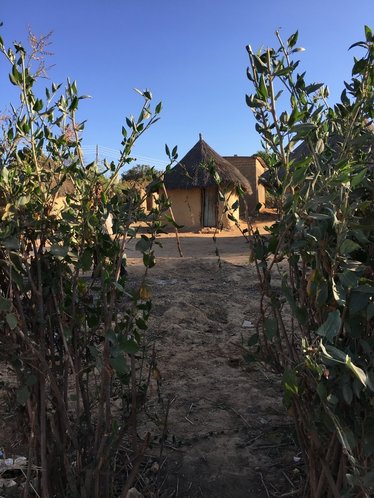 On the afternoon of the second day our team was joined by another doctor, Dr. Samuel Verkerk. He is an ophthalmologist from the Netherlands and is currently serving in Macha, Zambia, about a 3-hour drive Northeast of Zimba. He arrived in January and is continuing for two and a half more years while he is developing an eye clinic. He hopes to find a Zambian ophthalmologist to train and to whom to leave the clinic. As clinic ended early this day we had time to walk through the surrounding community. On our walk, we ran into a patient, Ernest, who acted as our informal tour guide, generously giving us his time and knowledge. Ernest walked us through a “neighborhood” which is a collection of huts. One resident eagerly offered to show us his hut, which is an 8 foot by 8-foot room built of mud with a thatched roof. The only things inside this windowless room was a mat for sleeping and some sandals on a dirt floor. He also was excited to show us his pig hut, which had a thatched roof and was built of sticks, branches and any other materials he could find such as an old tire. Dr. Verkerk’s accompanied us on this walk. His time in this country proved to be a wealth of information about this culture, teaching us much about its male dominated family structure. As we continued, we passed many stands and small shops selling a variety of products from fresh produce to chips, soda and more items we could not recognize. We also passed bars, barbers, restaurants, butchers and more. Our tour guide showed us a primary school and the campus of a boarding school. We saw the soccer field where Ernest helps train a local team. The team had congregated to try to solve the problem of an air bladder protruding from the ball. On our walk, we were often greeted by a chorus of young children eager to practice their English, which would consist solely of “How are you?” Our reply of “Fine” and “How are you?” would initiate a gaggle of giggles. Everywhere we walked there was trash; pieces of plastic bottles, chip bags, banana peels, smalls boxes, shoe parts, wrappers and more littered on the ground. Most people burn their trash because they don’t have a garbage pick-up service. We are so accustomed to throwing our trash in a bag and having a service whisk it away to an unseen landfill. They don’t have this luxury, so the trash lies where they leave it. It makes us think about this culture as it adopts western products and their efficient delivery systems in containers such as plastic; how that may be a burden on an immature infrastructure; and, despite our mission here to bring western medical advances to the third world, we wonder if all of our western influences are truly advances that are good for all people everywhere. BLOG #2:
Our volunteer experience… The work done here is a function of the type of issues patients bring and the resources available. Flexibility is a must. Regardless, these people are welcoming, very friendly and appreciative. Patients are often already lined up at the door when we arrive. Some will spend the night on the porch outside the clinic in order to be seen the next day. In fact, one patient brought his mother two weeks earlier than our team’s arrival. An example of how eager they are for care. We’ve seen a variety of ailments. Some include injuries due to aggression or foreign objects stuck in the eye (sticks, bugs, glass) as well as a fair share of cataracts. The equipment that the IVV clinic houses centers around spectacles, cataracts, glaucoma, and the removal of growths. Sometimes, nothing can be done to help a patient. Western medicine has not been able to reach all corners of the world. Despite the fact that in the US we can readily fix a macular hole or retinal detachment, nothing can be done here without the correct equipment. It is heartbreaking to turn away these patients when you know the only limiting factor is geography. 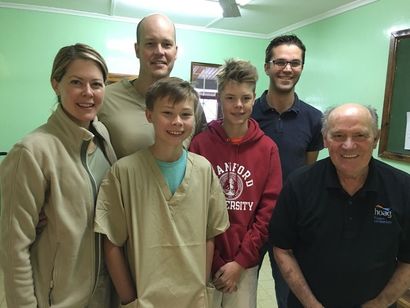 The team- Tracy Sanford, Dr. Matt Wood, Walker Wood, Sanford wood, Dr. Samuel Verkerk, Dr. James "Bud" Tysinger The team- Tracy Sanford, Dr. Matt Wood, Walker Wood, Sanford wood, Dr. Samuel Verkerk, Dr. James "Bud" Tysinger BLOG #1: Our First… This is our first time serving in another country, our first time living with Zambians, our first time “window” shopping in a 3rd world market. Too many firsts to list them all, but definitely our first time working for IVV in their Eye Clinic in Zambia. To describe it in a word, the experience is eye-opening (pun intended). We come from the central part of the US (Nebraska for those that know US geography), and we are quickly realizing just how fortunate we are – maybe taking for granted our education, healthcare, transportation, communications and so much more. When you work in a 3rd world country the differences are readily apparent. However, this experience is enriching in so many ways, making us appreciate our fortune. With that in mind we are embracing the cultural differences to see life through another perspective. The most interesting experience our first day was attending chapel before beginning clinic. This simple daily ritual affords beautiful acapella music and a highly energetic sermon given in English and the dominant language of southern Zambia, Tonga. At this service, in particular the minister introduced our team to the community, and we were welcomed with a hearty laugh as he could not pronounce our names. We will stay a week and are sure to see more firsts. For instance, we are looking forward to our first Zambian meal (Sylvia is a great cook but makes mostly western meals). It is comforting that guest house accommodations are good: there is running water, and yes, you can drink it, and every morning there is a hot shower and hot coffee to start our days off just like home. |
Archives
March 2018
Categories |
